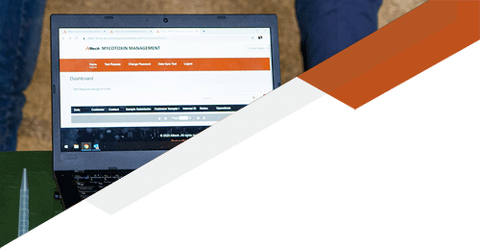

Reaping THE Data Rewards
Author: Nick Adams, Global Director, Alltech Mycotoxin Management
In recent years, the increased awareness of mycotoxins globally has led to progress in many areas. Perhaps most fundamentally, the increased awareness has driven more research into the impact of mycotoxins on animal performance, including the generation of meta-analyses for certain species. This aids better understanding of the link between mycotoxin contamination and the performance of animals in the field. Another driver of increased awareness has been the understanding of the role of changing agricultural practices and climatic conditions that have seen mycotoxin contamination of key global grains become an accepted norm.
As awareness has increased, so has the testing for mycotoxins in the field.
This is both to meet regulatory requirements and to better understand the mycotoxin element of ingredient quality for optimizing feed formulation and animal performance. More mycotoxin testing yields more data, which, if accessible, provides a powerful insight into contamination profiles of key grains in different countries, regions and seasons across the world.
Despite the various testing taking place, most data remains fragmented and inaccessible.
Through its 37+® mycotoxin analysis, Alltech analyses approximately 7,000 samples of ingredients, forages and feeds each year from 65 countries around the world.
This data is maintained within a central database for easy access, and interrogation can provide insight into contamination patterns and levels of risk. While the Alltech 37+ analysis offers a beneficial and in-depth insight into mycotoxin contamination, analyzing 54 individual mycotoxins, one drawback of this method is the sheer number of ingredient samples or finished feeds tested each year. The costs associated with carrying out such a comprehensive analysis and the requirement for the sample to be sent to a laboratory, often overseas, means that this type of analysis tends to be used more sparingly, and with more complex matrices as opposed to individual grains, such as corn.
Where LCMS testing methods like Alltech 37+ are not always feasible, producers regularly use more straightforward immune assay-based methods. These rapid test kits are based on lateral flow devices. While these methods do not identify the same number of mycotoxins as Alltech 37+, they provide an ideal alternative for rapid testing of key mycotoxins, such as deoxynivalenol, zearalenone, fumonisin and aflatoxin. It is often necessary to monitor these mycotoxins for regulatory compliance. They are also useful as markers for wider mycotoxin contamination, serving as a warning for animal health and performance implications. These systems are numerous around the world, being used regularly within feed mills, grain elevators and at a farm level. The key challenge with these systems is their connectivity or lack thereof, rendering the vast majority of this data only usable at a very local level.
Alltech, through its partnership with Neogen, has developed the Alltech® RAPIREAD™ mobile app to help link up the data being gathered around the world by rapid test kits.
By using the Alltech RAPIREAD app in combination with the Neogen® Raptor integrated platform, users cannot only conduct a rapid mycotoxin assay — providing a result within 10 minutes — they can also upload that result to the Alltech RAPIREAD global database. This subsequently provides the user with an interpretation of their results based on the specific species they are feeding. Capturing data in this format allows those throughout the feed supply chain to gain a better understanding of regional, global and seasonal mycotoxin contamination patterns.
Through this approach, Alltech and Neogen aim to provide a complete service to users. In addition to fast and reliable results from proven technology, users also receive real-time interpretations of those results and have the ability to look at contamination trends and comparisons to other results, both regionally and globally.
As the global trade in grains and feed ingredients continues, the ability to better connect and interpret global contamination data becomes more valuable to those throughout the animal feed sector. Alltech RAPIREAD has been specifically developed to meet these goals.